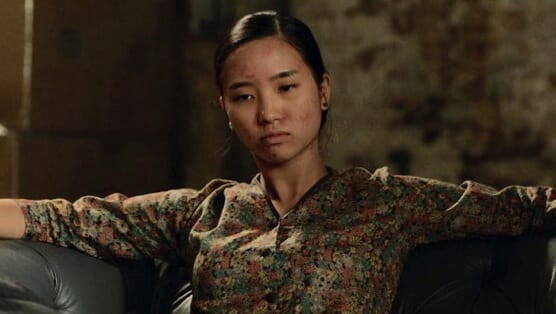Orange is the New Black: “Fake It Till You Fake It…”/“Ching Chong Chang”
(Episode 3.05/06)

“It can’t be that easy.” Amy Amatangelo was so right to question the MCC takeover in our last review of Orange is the New Black. The writers of this series have always done a good job of incorporating the prison officials into a narrative that really centers around the women at Litchfield prison. So when we see them getting their hours and benefits cut, we can’t help but feel for them. Now, it’s been argued that Season Three has no villain, but this corporation is it for me. In “Fake It Till You Fake It Some More“ we see how the creation of The Big New Job starts tearing everyone apart. What’s exciting about this is that a corporate villain—as opposed to a single, bad individual like a Vee or a Pornstache—reminds us that no prison exists in a vaccuum, and the people running these places are criminals on a much grander scale than the inmates.
First we see the Latinas start falling apart when Marisol applies for the new gig. We learn that Marisol believes—even in prison—that she’s destined for greater things. Her backstory is almost comical, because we meet this young, punk-looking Latina who wants to do just about anything to avoid sitting at a sewing machine all day like her mother, so she starts selling faux acid to the kids at school. Of course, most kids just wanna feel high and want everyone to think they’re high, so none of them catch on to her hustle—but one poor “high” soul takes a plunge to his death. Marisol is arrested for not selling drugs, and once again we get to see this system for what it truly is—a joke, a game, or a trap. (And of course by episode’s end she winds up right where she never wanted to be—sitting at a sewing table.)
The best part about that scene is that, as Marisol is being arrested, we hear the awful MCC representative explaining to Caputo how they chose the women for the new job. That test was a joke, and they never looked at the answers anyway. “My system is to make the ladies think there is a system. We’ve had a lot of success with this.” Flaca assumed she’d be fine, as long as she wasn’t selling actual drugs, and she was wrong. The prisoners often find out that even when they follow the rules and play along—take the tests, work the jobs—they get screwed over. What’s worse is, because it seems like there is an actual test, they blame themselves, or their mothers, or their children when they end up failing. But the truth is the problems are much bigger than those individuals.
The breach in the Latinas with Flaca’s leaving works well for Red, who has been softening her look in an attempt to get on Healy’s good sign. This was all pretty comical—watching Red ask Piper if her look is “harsh.” Girrrllllll, yes! Piper, oh diplomatic Piper, responds with “not spiking your hair and a lighter lip couldn’t hurt.” And for any of us who thought for two seconds that Healy and Red were maybe going to be a thing (I sort of did), Red swiftly reminds Healy that they are in a prison. When he goes home at night he locks her in, so he shouldn’t be surprised that she’s flirting with him and using the one thing she has left as currency. In the end, he softens a bit and gets Caputo to let her back in the kitchen. It’s going to be interesting to see if the takeover goes down. And yes, watching her whip that apron back on was pretty thrilling.
“Ching Chong Chang” brings us Chang’s horribly depressing backstory—at least the beginning of her story. As hard as it was watching her brother treat her like the world’s greatest burden, I have to say that I loved watching her transform from this invisible duckling (in her backstory, at Litchfield, and even in our minds) to a boss—that image of her sitting on the couch and giving out orders was great. She looked like her authentic self, kind of like she does later in the episode, watching movies on a hidden iPhone and eating oranges. Something about that is more endearing than the other survival techniques we’ve seen on the show—drugs, alcohol (or hooch), and of course rampant sex in the Church.
While I enjoyed Chang’s narrative, there have definitely been some lulls in these episodes, and it’s hard to tell how to interpret this season. On the one hand, it feels slower and, admittedly, a bit boring in comparison to what we saw in the first two seasons. But I suspect that things will make more sense at the finish. Let’s see where the writers are going with all this.
Stray Observations: